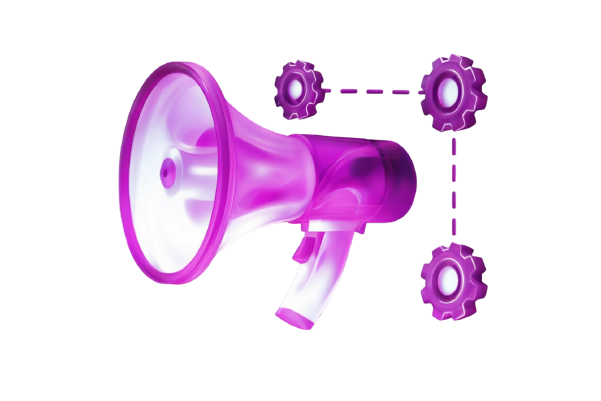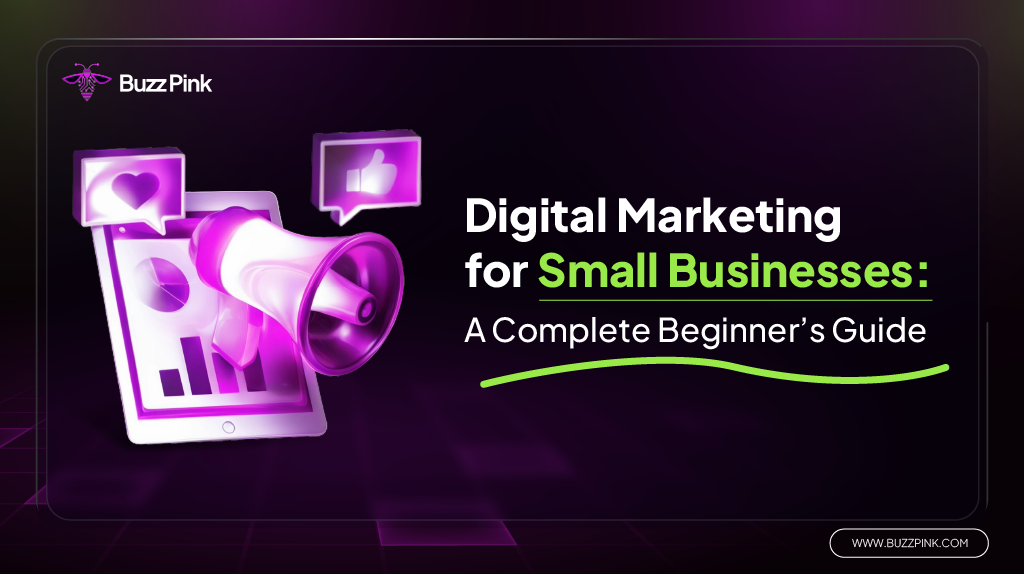Any business out there requires assistance in filling gaps. A luxurious business, a mid-developed startup, or, most importantly, a small business cannot stand on its own. Digital marketing for small businesses is essential for publicity and recognition, which is the first step toward gaining customers.
This article will reveal and explain why digital marketing for small businesses is critical, not only to keep up with today’s digital era or simply to establish a brand presence, but also for long-term sustainability.
What Is Digital Marketing for Small Businesses?
 Digital marketing is a set of strategies and tactics used to promote a product or service through digital channels. This channel can take the form of social media, such as Instagram or Facebook, a search engine like Google, email, or even a website. The goal is to reach out to the target audience online when they are most active.
Digital marketing is a set of strategies and tactics used to promote a product or service through digital channels. This channel can take the form of social media, such as Instagram or Facebook, a search engine like Google, email, or even a website. The goal is to reach out to the target audience online when they are most active.
Digital marketing for small businesses in a flash may appear to be expensive. In reality, it’s the latter. They are not required to promote it through television advertisements or news portals. With the right digital marketing strategy, they can easily compete with brands that advertise on a larger platform.
Why Digital Marketing for Small Businesses Is Important
 Digital technology is rapidly evolving, and it has transformed how businesses and customers interact. Nowadays, many people use the internet to search for products or services, including those that are local. Because of that, having a solid digital marketing strategy for small businesses is no longer an option but rather a requirement.
Digital technology is rapidly evolving, and it has transformed how businesses and customers interact. Nowadays, many people use the internet to search for products or services, including those that are local. Because of that, having a solid digital marketing strategy for small businesses is no longer an option but rather a requirement.
Small businesses can reach a larger audience with a smaller budget by using digital channels such as media, social media, search engines, and email. As a result, digital marketing plays an important role in the growth of small businesses, allowing them to compete with large brands and be recognized by potential customers.
Why Small Businesses Need Digital Marketing
 Small businesses face challenges like limited budgets and low visibility, making it hard to stand out. Unlike big brands, they can’t rely on expensive ads. That’s why digital marketing is essential, it gives them affordable tools to reach the right people and grow steadily.
Small businesses face challenges like limited budgets and low visibility, making it hard to stand out. Unlike big brands, they can’t rely on expensive ads. That’s why digital marketing is essential, it gives them affordable tools to reach the right people and grow steadily.
More customers now search online before buying anything. Without digital marketing, small businesses risk being invisible. With the right strategy, they can connect with their audience, build trust, and compete on a level playing field.
Limited Budget and Resources
Many small businesses do not have large budgets like large corporations, and as a result, they require an effective strategy to keep costs down while promoting products or services. Digital marketing provides relatively inexpensive solutions with a significant impact. For example, by actively engaging with social media or sending promotional emails to customers. Small businesses can increase their sales without breaking the bank using digital marketing.
Furthermore, digital marketing can be customized to meet your specific needs and abilities. There is no need to invest a large sum of money right away. You only need a simple strategy, and once the results begin to show, you can improve the outcome for a higher return on investment.
Focus on the Niche Market
Many small businesses cater to a very specific audience, such as local coffee enthusiasts. It must come from a specific part of the country that appeals to them. Small businesses can reach their target audience through digital marketing, and once they do, the right customers are willing to travel long distances for a taste of their company’s offerings.
Read More: What Is Programmatic Advertising and Why It Matters in Digital Marketing
Advertising on social media or Google Ads can also be tailored so that it only appears to the intended audience using programmatic advertising. As a result, the chances of increased sales are greater because the message has finally been delivered.
Flexibility and Scalability
One of the benefits of digital marketing is the ability to scale gradually. Small businesses can start small, such as setting up social media accounts, and then gradually expand their strategies to include SEO, paid advertising, and email marketing. This can all be done based on the company’s capabilities and growth.
This strategy reduces risk. If a strategy fails, small businesses will not suffer significant financial losses. In contrast, if it works, they can increase their efforts and achieve even greater success.
Compete with Large Companies
Previously, only large companies could advertise on television or radio. However, digital marketing enables small businesses to come across just as trustworthy. A small business can appear on the first page of Google or go viral on TikTok and Instagram by creating engaging content and employing the right strategy.
Digital marketing levels the playing field. This means that small businesses have an equal chance of gaining public recognition if they understand how to use digital technology effectively.
How Digital Marketing Helps Small Businesses
Digital marketing is about using the right tools to drive real results. For small businesses, this means turning limited resources into meaningful growth by targeting the right audience, at the right time, with the right message. When done right, digital marketing becomes one of the most powerful drivers of visibility, engagement, and revenue.
It helps small businesses thrive. From increasing brand awareness to building loyal customer relationships, digital marketing opens doors that traditional marketing can’t. It gives small businesses the edge they need to stand out, connect, and grow in today’s fast-paced digital world.
Increase Brand Awareness
People must first be aware of your company’s existence before they will be able to purchase your products or use your services. Digital marketing provides a consistent and cost-effective way to increase brand For example, by developing a search engine optimized (SEO) website, you can appear in Google search results when people look for the products you provide.
Additionally, being active on social media is essential. Small businesses can build lasting relationships and expand brand awareness by regularly posting insightful content and communicating with followers.
Higher ROI
The goal of marketing is not only to attract customers to your store or website, but also to persuade them to buy. This is a crucial element of digital marketing. Small businesses can deliver the right offers to people who are actually interested by using targeted ads and personalized emails.
For example, someone who has previously visited your website may be automatically sent a discount email. This technique is known as remarketing, and it has the potential to significantly increase sales opportunities.
More Engagements
Building loyalty requires direct interaction with customers. Small businesses can quickly respond to customer inquiries, solicit feedback, and share updates via social media. This inevitably leads to stronger and more meaningful relationships.
Customers feel appreciated when brands respond to their comments or messages. Customers will become not only buyers but also advocates or even promoters of your company.
Gaining Knowledge on Competitors
Monitoring what your competitors are implementing is a valuable tactic. Small businesses can use tools like Google Analytics or SEMrush to see what keywords their competitors are using, what kind of content they’re producing, and how they’re engaging their audience.
From there, you can figure out what is working and apply it to your own business in a better or different way. You can also avoid the errors that they have made. It’s not solely copying what your competitors are doing, but also improving.
A Guide to Starting Digital Marketing for Small Businesses
Before deciding to implement a digital marketing strategy, you should first realize and understand why it is necessary for your business, rather than simply following the trend that everyone else is doing it, so you should too.
Implementing a digital marketing strategy necessitates the allocation of resources, time, and effort. As a result, you should not take this lightly. Wrong movements can have an impact on your business, especially if it is still small. You do not want your small business to go bankrupt.
Decide Your Goal
The most important first step is determining what you want to accomplish. Do you intend to double your social media popularity? How do you increase sales? Or simply become more well-known?
Defining these objectives will assist you in developing a targeted marketing strategy. Without a clear goal, you risk wasting time and energy on activities that will not yield significant results.
Know Your Audience
You must understand your target audience in order for your marketing message to be effective. Consider who your ideal customer is, their age, location, interests, and internet habits. Using this information, you can create more personalized and engaging content and advertisements that are tailored to the needs and lifestyle of that audience.
Check Your Resources
You should also be upfront about your abilities. What is your spending limit? Do you have a team, or will you be doing it on your own? What digital tools do you currently own? These are essential for developing a realistic strategy. For example, if you don’t have an advertising budget, you can prioritize organic content and SEO first.
Research Competitors
Constantly keep track of what your competitors are currently up to. Visit their websites, follow their social media accounts, and pay attention to the advertisements they run. This can provide you with plenty of ideas and inspiration. You can also learn about their keywords and ad types using tools like Ahrefs or Facebook’s Ads Library. This can aid you in eventually coming up with a more effective strategy.
Decide The Content Pillars
Consider the main topics you plan to cover on a regular basis. For example, if you own a small jewelry store, you could focus on topics such as how to pick anti-corrosion material, types of gems, and how to take care of the jewelry. Having a clear theme will make it easier to create relevant and useful content while also establishing yourself as an expert in your field.
Pick the Right Digital Channel
Not every digital channel is effective for every single business. Select the strategies that most accurately fit your specific audience and objectives. Popular options include websites, Google and Bing search engines, social media platforms such as Facebook, Instagram, and LinkedIn, email, and, last but not least, content such as blogs, videos, and podcasts.
Plan A Strategy for Each Channel
Each channel requires a different strategy. Don’t apply the same approach to every channel. For example, content on Instagram may be more visual and casual, whereas email should be more direct and personal. Also, set goals for each channel, such as increasing website traffic through SEO or acquiring new customers through social media advertising.
Trials and Errors
The secret to being successful in digital marketing is to constantly adapt and refine your strategy. Attempt various types of content, posting times, and ad formats. Determine which ones receive the most attention or generate the most sales. Use A/B testing, for example, to determine which email subject lines receive the most opens. This way, you can keep improving and avoid stagnation.
Types of Digital Marketing Suitable for Small Businesses
There are several digital marketing ideas for small businesses that can be put to use. Each has advantages and disadvantages, but they all serve the same purpose: to assist you in expanding your business.
-
Search Engine Optimization (SEO)
SEO is the strategy of helping your website become visible on search engines such as Google. Its strategy entails creating high-quality content, using relevant keywords, and ensuring your website is optimized and mobile-friendly. This allows you to attract visitors without paying for advertisements.
Read More: SEO and SEM: What’s the Difference and Why It Matters
-
Search Engine Marketing (SEM)
If you need quick and instant results, an SEM strategy such as Pay-Per-Click can help. You can bid a bargain to have your domain displayed at the top of the search engine results list. This strategy is appropriate for competitive business markets.
-
Social Media Marketing (SMM)
Use social media to establish relationships with existing and aspiring customers. Post on a regular basis and respond to their comments, whether they are negative or positive. Even just liking their comment can make them feel seen and important. This plan is beneficial in terms of ensuring long-term customer loyalty.
-
Email Marketing
Send out regular emails with promotions, news, or interesting information. This is a low-cost way to maintain relationships with current customers and encourage them to return. However, pay attention to your subject wording because it may end up as spam.
-
Influencer Marketing
If you sell a product rather than a service, such as food, perfume, or jewelry, partnering with a local influencer can help you increase sales. They can promote your product to their followers in their own unique ways. It does not have to be a large influencer, small ones with loyal followers are equally effective and require less budget.
An Agency Expert in Digital Marketing for Small Businesses
Buzz Pink has a solution tailored to your business goals, whether you’re targeting your neighborhood or a specific niche. Our team offers a wide range of services, including SEO, SEM, SMM, and email marketing.
Our marketing is more than just buzzwords. Buzz Pink understands how to create buzz that attracts customers and keeps them around. We have already proven our success by receiving over 30K organic visitors per month.
If you’re looking for a low-cost digital marketing agency for your small business, Buzz Pink is only a phone call away!
Conclusion
Digital marketing is essential for small businesses to grow and compete in today’s digital world. With limited budgets, small businesses can still build brand awareness, reach target audiences, and drive engagement through cost-effective strategies like SEO, social media, and email marketing.
By using the right tools and approaches, small businesses can scale their efforts, increase visibility, and compete with larger brands. Digital marketing offers flexibility, measurable results, and the chance to build lasting customer relationships, making it a key driver of sustainable growth.
Kamila Putri is a content strategist and digital marketing expert who helps brands craft messages that resonate and drive results. With a strong foundation in SEO, brand voice, and data-driven strategy, she has produced content that performs, whether it's optimized web copy, lead-generating campaigns, or conversion-focused messaging. At Buzz Pink, she applies this expertise to help clients grow through smart, search-focused digital strategies that engage, inform, and convert.


